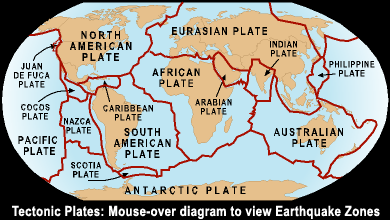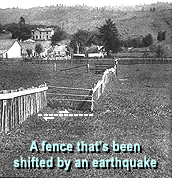
What happens when plates collide? It depends
how the plates are moving when they meet:
• When two plates
collide head-on, they push each other up and form mountains.
That's how the Himalayas and other great mountain ranges (including the
Rockies, long ago) were created.
• When one plate
dives below another plate, it creates a subduction zone
as the diving plate is crushed and melted. This process often creates
volcanoes as the magma (molten rock) rises up to the surface.
 •
When two plates slide past each other,
they create a transform fault, like the San Andreas fault. •
When two plates slide past each other,
they create a transform fault, like the San Andreas fault.
Earthquakes can happen in any of these situations. Despite
the powerful forces driving plate movement, the plates themselves spend
much of the time locked in place by the friction of the plates rubbing
against each other. Eventually, however, they build up so much pressure
that the plates abruptly snap forward. Then the ground can shift a few
feet—or a few dozen! Shock waves from that sudden motion shoot out
iin all directions, creating an earthquake.
Next
>
|